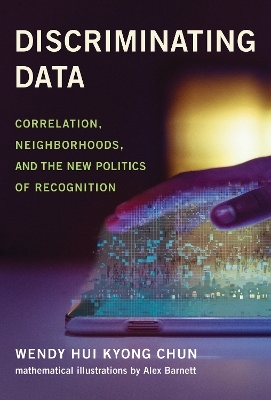
Discriminating Data
MIT Press (Verlag)
978-0-262-54852-6 (ISBN)
In Discriminating Data, Wendy Hui Kyong Chun reveals how polarization is a goal—not an error—within big data and machine learning. These methods, she argues, encode segregation, eugenics, and identity politics through their default assumptions and conditions. Correlation, which grounds big data’s predictive potential, stems from twentieth-century eugenic attempts to “breed” a better future. Recommender systems foster angry clusters of sameness through homophily. Users are “trained” to become authentically predictable via a politics and technology of recognition. Machine learning and data analytics thus seek to disrupt the future by making disruption impossible.
Chun, who has a background in systems design engineering as well as media studies and cultural theory, explains that although machine learning algorithms may not officially include race as a category, they embed whiteness as a default. Facial recognition technology, for example, relies on the faces of Hollywood celebrities and university undergraduates—groups not famous for their diversity. Homophily emerged as a concept to describe white U.S. resident attitudes to living in biracial yet segregated public housing. Predictive policing technology deploys models trained on studies of predominantly underserved neighborhoods. Trained on selected and often discriminatory or dirty data, these algorithms are only validated if they mirror this data.
How can we release ourselves from the vice-like grip of discriminatory data? Chun calls for alternative algorithms, defaults, and interdisciplinary coalitions in order to desegregate networks and foster a more democratic big data.
Wendy Hui Kyong Chun is Simon Fraser University’s Canada 150 Research Chair in New Media and Professor of Communication and Director of the SFU Digital Democracies Institute. She is the author of Control and Freedom, Programmed Visions, and Updating to Remain the Same, all published by the MIT Press. Alex Barnett is Group Leader for Numerical Analysis at the Center for Computational Mathematics at the Flatiron Institute in New York. He has published more than 50 research papers in scientific computing, differential equations, fluids, waves, imaging, physics, neuroscience, and statistics.
Preface ix
Introduction: How to Destroy the World, One Solution at a Time 1
Red Pill Toxicity, or Liberation Envy 29
1 Correlating Eugenics 35
The Transgressive Hypothesis 75
2 Homophily, or the Swarming of the Segregated Neighborhood 81
3 Algorithmic Authenticity 139
Correlating Ideology, or What Lies at the Surface 173
4 Recognizing Recognition 185
The Space Between Us 231
Coda: Living in Difference 239
Acknowledgments 255
Notes 259
References for Mathematical Illustrations 317
Index 319
| Erscheinungsdatum | 22.02.2024 |
|---|---|
| Zusatzinfo | 69 BLACK AND WHITE ILLUS. |
| Sprache | englisch |
| Maße | 152 x 229 mm |
| Themenwelt | Informatik ► Datenbanken ► Data Warehouse / Data Mining |
| Informatik ► Theorie / Studium ► Künstliche Intelligenz / Robotik | |
| Naturwissenschaften | |
| Sozialwissenschaften ► Politik / Verwaltung ► Staat / Verwaltung | |
| Sozialwissenschaften ► Soziologie | |
| ISBN-10 | 0-262-54852-6 / 0262548526 |
| ISBN-13 | 978-0-262-54852-6 / 9780262548526 |
| Zustand | Neuware |
| Informationen gemäß Produktsicherheitsverordnung (GPSR) | |
| Haben Sie eine Frage zum Produkt? |
aus dem Bereich


